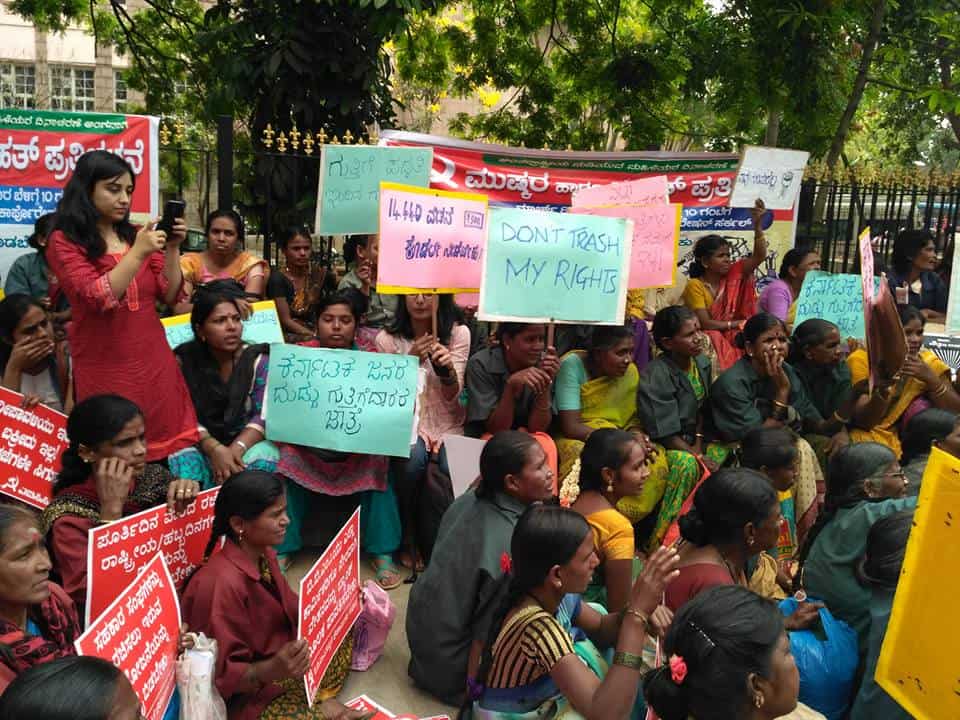The termination of 80 workers of India’s first Public Sector Undertaking (PSU), M/s Indian Telephone Industries (ITI) Limited in Bengaluru on December 21st, 2021 is the latest instance of the long history of labour abuse at ITI. Their struggle ever since for fair treatment and wages reached its 100th day on March 10th.
Though the workers had put in between 3 to 35 years at the ITI, they were all still designated as “contract workers”. In recent times, as with all PSUs, ITI’s contract workers have been increasingly vulnerable to being “casualised”—that is transformed from being employed chiefly on permanent contracts to one engaged on a short-term or casual basis. In this case, the workers were punished for unionising, had been denied timely payment of wages and benefits, and subjected to arbitrary de-promotions, not to mention abrupt termination.
Coinciding with the strike’s 100th day, a fact-finding team of concerned citizens released a 25-page report summarising the abuses faced by the retrenched workers. “We feel that the struggle of the ITI workers in the face of such adversity is an ode to resilience and claims making for constitutional rights, fairness, inclusion, and citizenship,” say the report authors Akash Bhattacharya, Malini Ranganathan, Juhi Tyagi, Rajendran Narayanan, and Sushmita Patil. “Industrial workers’ and farmers’ struggles cannot be disconnected: they are both part of a broader political-economic trend that is concentrating wealth and power in the hands of elite corporate management, both public and private”.
Read more: Caste pervades every aspect of life in Bengaluru: Panel discussion
In addition to exposing the abuses faced by contract workers, the report examines the history of employment and reservations in PSUs. About a decade ago, sociologist Dilip Subramaniam conducted studies on the caste, class, gender, and linguistic backgrounds of ITI workers.
As a public sector enterprise mandated to have reservations for marginalised castes, he found that employment in ITIs, both permanent and on contract, had historically provided an avenue for modest upward mobility for members of Dalit castes. This was true of PSUs in general. In the first decades of its existence, migrants from landless schedule caste/scheduled tribe (SC/ST) communities within Karnataka (such as Kolar District) as well as from Tamil Nadu and Andhra Pradesh sought out opportunities in ITI.
Segregation even in the canteen
But conditions have changed radically for workers from the marginalised castes in the neoliberal period as they have been increasingly contractualised and casualised.
The retrenched ITI workers suspect the action against them was in retaliation for unionising. Over the past two years, workers have come together to form the Karnataka General Labour Union (KGLU), affiliated with the All-India Central Council of Trade Unions (AICCTU). This move to unionise was to bring attention to a range of abuses workers have faced.
For instance, the fact-finding report found that workers have faced a range of coded humiliations. According to interviews reproduced in the report, contract workers faced segregation in dining messes. They were being served last or not being served the same quality of food as permanent employees.
Read more: Talking caste in Bombay
In December 2021, the Social Welfare Department had issued a letter to the ITI management warning against the illegal practice of manual scavenging work on the campus after the matter came to notice following the termination of two manual scavengers belonging. to marginalized castes. “It is clear that ITI has been reinforcing or turning a blind eye to caste indignities,” the report adds.
To add insult to injury, soon after the first COVID wave if 2020, ITI downgraded contract workers from “skilled” to “unskilled” based on their level of education, not experience. “Suddenly I became unskilled [from skilled],” said one contract worker. “My monthly salary became about Rs 5,000 less than before. As we have been working there for so long, we thought it is okay. We realized only later that we were not being paid even what they are supposed to give us.”

Caste and gender
Coded discrimination, in the sense of systematically reproducing inequality disproportionately affecting women and people from marginalised castes and classes, is a key feature of the contract labour system—a fact that must be recognized by the broader public.
This strike is not an isolated struggle but reflects the concerns of a broad swathe of workers. Advocate Clifton D’Rozario rightly refers to the contract system as nothing but modern-day slavery. Of the 80 workers who were terminated, nearly half are from Dalit backgrounds and a large number are women.
“The caste and gender aspects of the contract workforce cannot be missed,” says advocate Maitreyi Krishnan. “It is the historically oppressed communities who are compelled to work through such exploitative systems. Entire cities run on the blood and toil of workers who are denied basic dignified working conditions”.
Not surprisingly, the ITI workers’ movement has garnered solidarity from many quarters, including BBMP pourkarmarikas, Dalit organisations, street vendors and farmers’ organisations. On January 14th, 2022, veteran social and environmental activist Medha Patkar of the National Alliance of People’s Movements addressed the ITI workers, drawing connections across farmer and industrial worker struggles.
The demands of the workers are:
- To be immediately reinstated
- To be allowed to unionise without fear of retaliation
- To receive decent living wages and benefits (including maternity benefits)
- To be treated with the dignity and respect they deserve as core workers of the company—and as called for by the law.
The Regional Central Labour Commissioner has deemed ITI’s actions as a violation of the Industrial Disputes Act and has insisted that the workers be reinstated. But ITI has refused to comply despite facing a suite of labour rights cases.
The report authors have communicated the facts they uncovered to senior government representatives in New Delhi and Karnataka, strongly condemn the unlawful activities of ITI and demand penal action against the PSU.